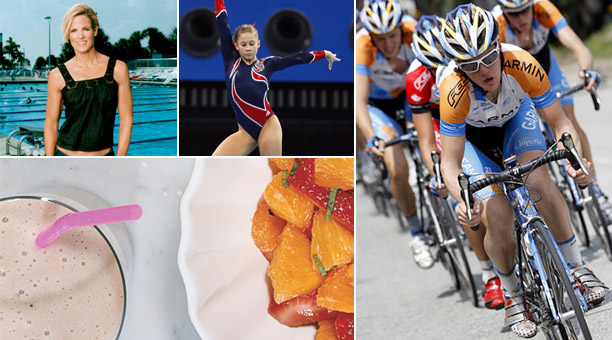
- July 27, 2012
- Katlin Owens
Eating Healthy for Energy: Recipes and Tips
Source: Epicurious
Eat like an athlete for optimal performance—whether you're running a marathon or just want more stamina for everyday life!
It happens to all of us: You promise yourself you're going straight from the office to the gym, but come quitting time, you're too exhausted to lace up your sports shoes. Heck, you barely have the energy to make yourself a snack. But chances are a snack is exactly what you need. "Food is fuel," says sports nutritionist Nancy Clark, M.S., R.D., and if you want to have energy for peak performance in athletic events—or for daily life workouts like your job or chasing a toddler—you have to fill up your tank with quality "gasoline."
To get tips on eating for energy and fitness, Epicurious spoke to Clark, as well as three top athletes: swimmer and Olympic gold medalist Dara Torres; gymnast, Olympic gold winner, and Dancing with the Stars winner Shawn Johnson; and Garmin-Slipstream Pro Cycling Team member Timmy Duggan.
Bananas
In addition to providing valuable nutrients, including potassium, vitamin C, and vitamin B6, bananas are a good source of carbohydrates. Duggan counts the fruit among his favorites when he's training (along with peanut butter and honey), because they're "simple, high-energy, and easy to digest." A plain banana makes the perfect preworkout snack. For something more substantial, mix one into a smoothie, spread one with nut butter, or use overripe bananas to make a quick bread.
Recipes to try:
Low-Fat Banana Bread
Power Waffles with Yogurt, Bananas, and Almonds
Sports Salads
"During training I seem to always stick to eating plenty of salad, chicken, and fish (sushi is my favorite)," says Johnson. The gymnast is doing the right thing by augmenting her salad with some lean protein for sustained energy and muscle repair. Toss in some carbs, too, for a high-energy meal. "Make it into a sports salad by adding beans, corn, beets, and toasted croutons," Clark suggests.
Recipes to try:
Chicken and Watercress Salad with Almonds and Feta
Beans
"Assuming they don't gas-propel you," as Clark puts it, beans are a great source of both protein and carbs in a heart-healthy and inexpensive package. Toss them into salads, soups, stews, chilis, and pasta dishes, or serve with quick-cooking brown rice and jarred salsa for a superfast supper. One of Clark's favorite snacks is hummus and pita because it combines legumes, healthy fats, and carbs into one very portable package.
Recipes to try:
Hummus
Balsamic Bean Dip with Fresh Veggies
Oranges and Other Vitamin C Stars
When you exercise, your muscles receive tiny tears—the vitamin C in oranges and many other fruits helps repair them. (You can search our sister site Nutrition Data for foods highest in vitamin C.) "I love oranges, all berries, and pineapples," says Torres, who makes a recovery shake with a meal replacement powder (she likes Living Fuel), fruit, and milk. For an all-natural version, Clark suggests a smoothie with yogurt, orange juice, bananas, and strawberries. Johnson revs up for training with a piece of chicken and some fruit.
Leave Your Comment
Many desktop publish packages web page editors now use model text
search for sites their infancy.